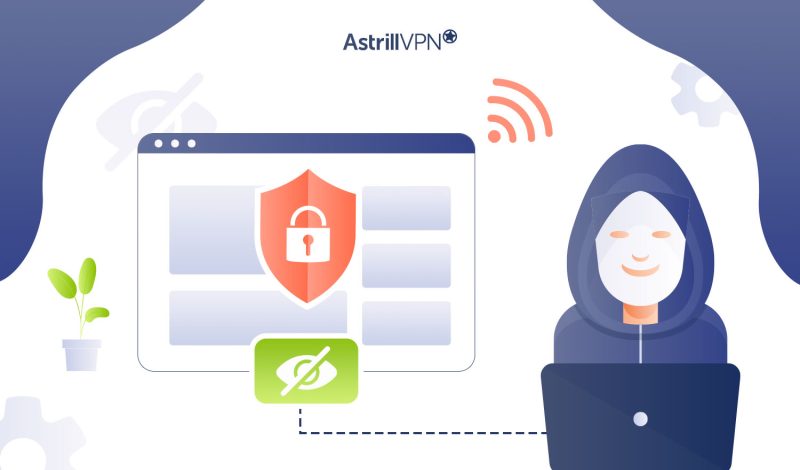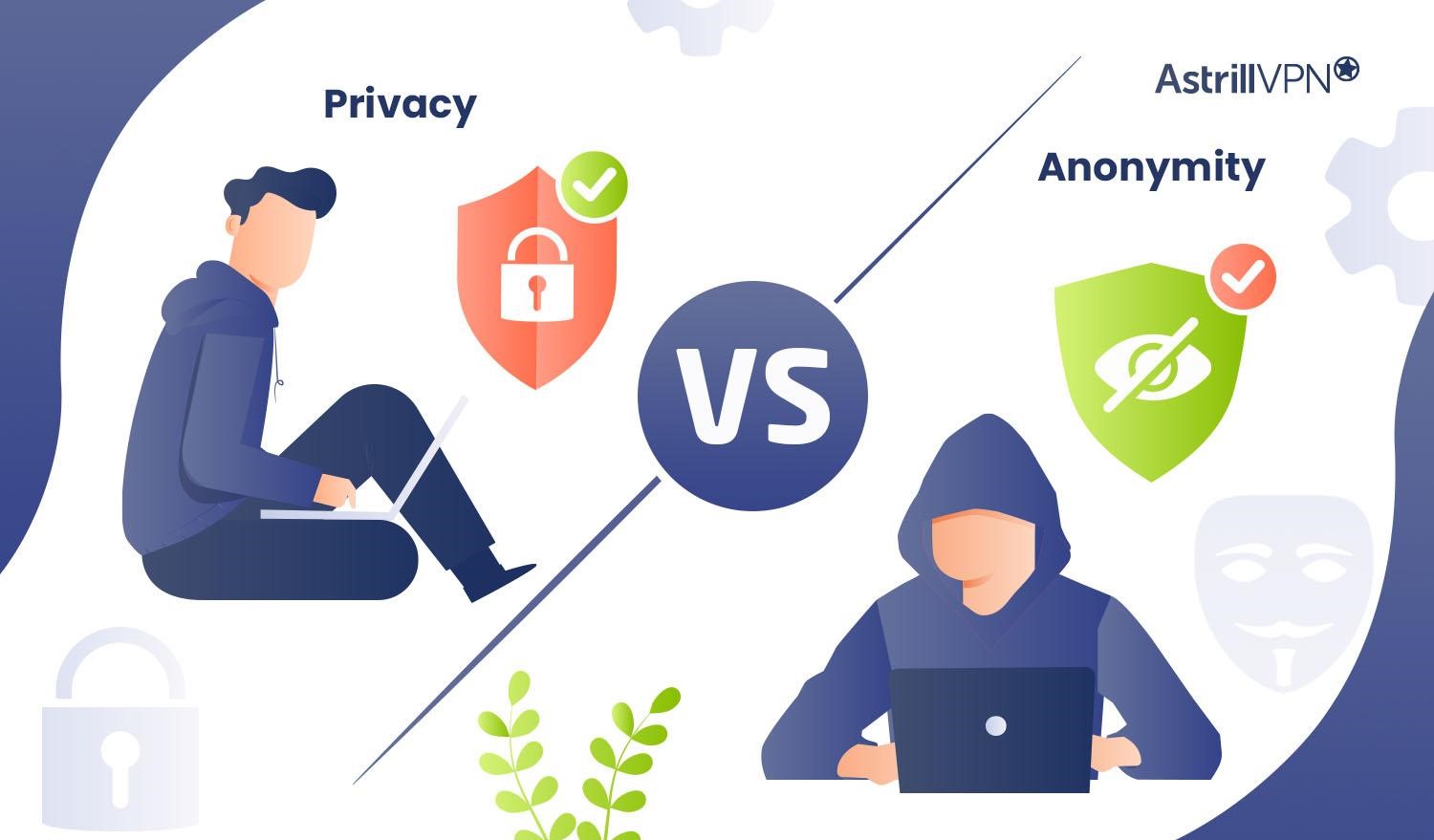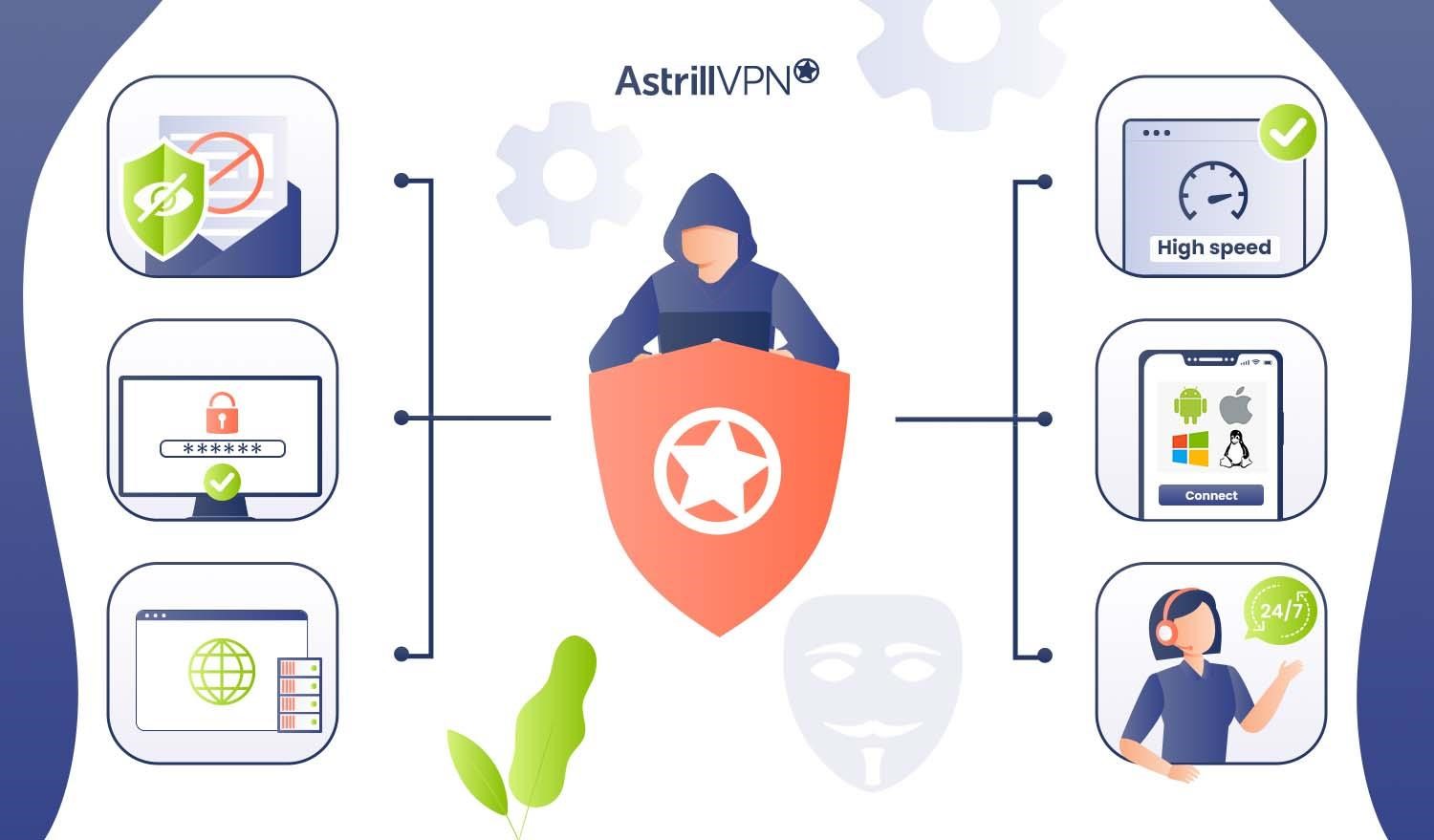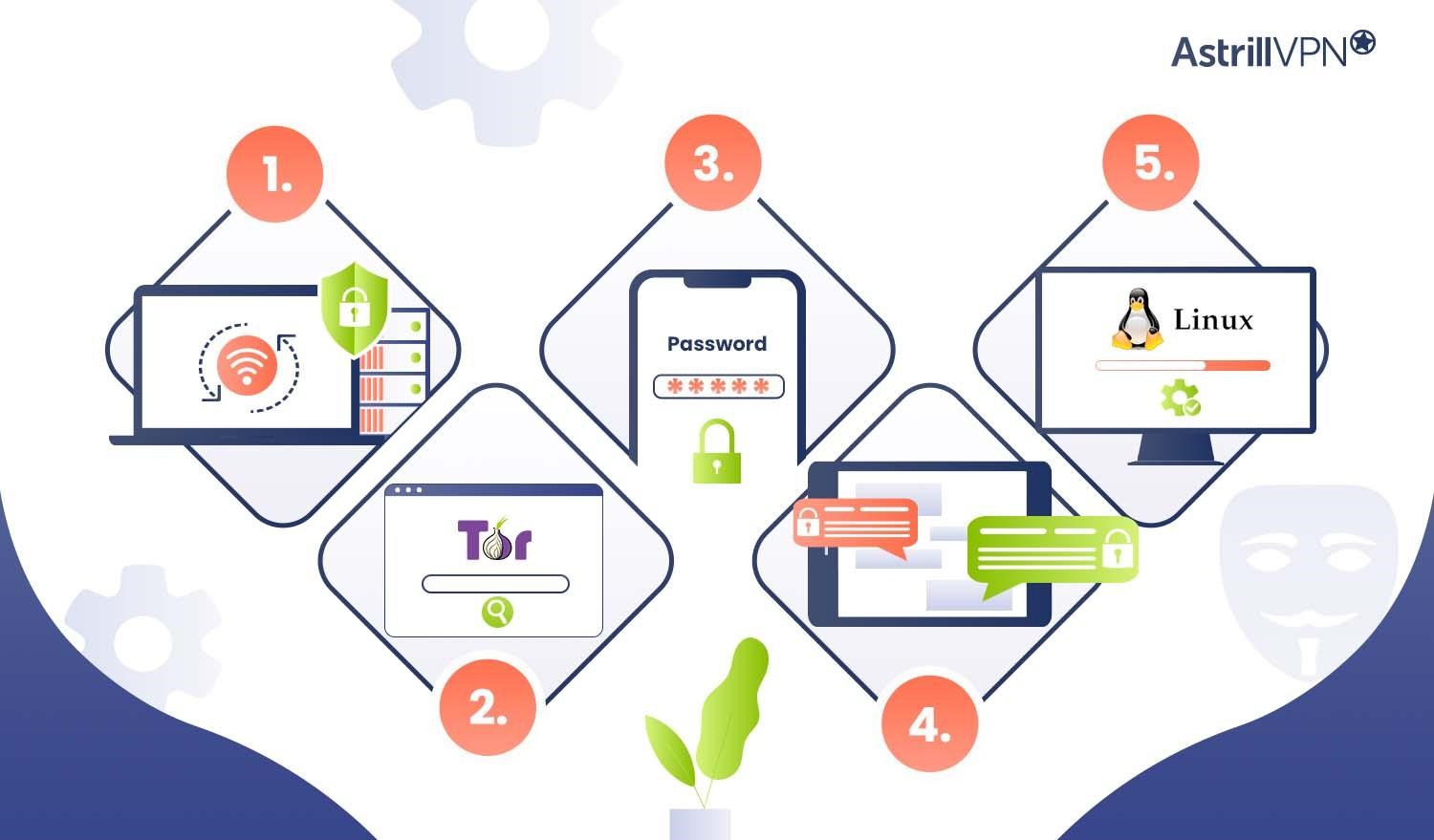How to Stay Anonymous Online: Hide your Identity

Bisma Farrukh

In today’s digital world, staying anonymous can be trickier than it sounds. Everything from the websites you visit to the messages you send is tracked and recorded, often without your knowledge or consent. Achieving true online anonymity requires the right tools and techniques. This guide will show you how to protect your identity, remain anonymous and keep your digital footprint minimal.
Table of Contents
Why Stay Anonymous Online? The Benefits of Anonymity
Online anonymity has some real upsides.
- First, it protects your privacy. When you search, browse, and communicate anonymously, you leave no digital footprint or trace of your online activities. Your personal information, location, and internet history remain hidden.
- Staying anonymous on internet also gives you more freedom of expression. You can explore unconventional topics or join controversial discussions without fear of embarrassment or backlash. Anonymity allows you to be your authentic self without worrying what others might think.
- Another benefit is increased security. Anonymous internet activity helps shield you from cybercriminals looking to steal personal data and digital spies tracking your every move. It reduces your vulnerability to threats like identity theft, hacking, and government surveillance.
- Finally, anonymity gives you unbiased access to information. When websites and search engines can’t collect your personal details, they can’t use that data to manipulate or filter your experience. You get a more impartial view of the world wide web.
What is difference between privacy and anonymity?

Online Privacy means keeping your personal information and online activities hidden from others. Anonymity takes it a step further by hiding your actual identity. Checkout the detailed comparison chat below between Privacy and Anonymity:
| Feature | Privacy | Anonymity |
| Definition | Controlling who has access to your personal data and online activities. | Completely hiding your identity so that no one can trace your actions back to you. |
| Personal Data Exposure | Some personal details may still be visible but are protected from unauthorized access. | No personal details are shared, ensuring full identity concealment. |
| Example | Using a social media account with strict privacy settings. | Posting on forums without an account or using a disposable alias. |
| Best for | Preventing data collection by advertisers, ISPs, and tech companies. | Avoiding identification in high-risk situations (e.g., whistleblowing, activism).Avoiding identification in high-risk situations (e.g., whistleblowing, activism). |
| Tracking Risks | Websites and trackers may still collect metadata but with limited access. | No direct tracking if proper measures are in place (e.g., VPN, Tor, burner accounts). |
Common Mistakes That Expose Your Identity
One of the biggest mistakes people make is using the same username across sites. Having the same handle on Twitter, Reddit, and gaming forums makes it easy for someone to connect the dots and trace all your online activity back to you.
Oversharing on Social Media
Oversharing on social media is another common blunder. Posting details about where you live, work, hang out, or your daily routine paints a vivid picture of your life and habits. This information can easily be viewed by anyone and used against you.
Be cautious of what you share on public profiles. Check your privacy settings and limit who can see posts about your location, job, relationships, religion, politics, etc. The less personal info you put out there, the harder it will be for someone to determine your true identity.
Using Public Wi-Fi Networks
Public wireless networks are notoriously insecure. When you connect to an open network at a coffee shop, library or airport, all your online activity and data can be seen by anyone else on that network.
If you need to use public Wi-Fi, enable a VPN on your device to encrypt your internet traffic and hide your browsing history from prying eyes. A VPN masks your IP address and location, preventing others from spying on you or stealing your personal information.
Using the Same Username Across Platforms
Reusing the same username across multiple websites makes it easy for someone to track your online activity. Therefore, it is recommended to use different usernames for different platforms. Also, avoid using personal information in usernames (e.g., name, birth year).
How to Stay Anonymous: Top Tips and Tricks
To stay anonymous online, there are a few tips and tricks you should know.
Use a VPN
A virtual private network or VPN masks your real IP address and encrypts your internet traffic. It hides your online activities and location, making it much harder to track what you do on the internet. Choose AstrillVPN service for browsing safely and remain anonymous.
Use Tor
Tor is free software that prevents people from learning your location or browsing habits. It hides your identity by bouncing your internet connection through several proxy servers located around the world. Tor is a great tool for staying anonymous on the dark web, but can also be used on the regular internet.
Use Anonymous Email Services
Sign up for an anonymous email service like ProtonMail, Tutanota or Dispostable to create throwaway email addresses that hide your real identity. These services don’t require personal information to register and don’t store IP addresses or user logs.
Use Disposable Credit Cards
To make purchases anonymously online, use virtual credit card numbers that hide your actual credit card number. Services like Privacy and Blur generate single-use card numbers that you can cancel anytime. The merchant will never see your real card details.
Clear Your Browser Data
Delete your browsing history, cache, cookies and saved website data regularly in your browser settings. This removes traces of your online activity and ensures websites cannot track what you view or search for. For even more privacy, use an incognito or private browsing mode.
Avoid Public Wi-Fi
Public wireless networks are risky to use since it’s easy for others to see what you’re doing on the internet. Only access sensitive accounts or conduct anonymous browsing on a secure private network with encryption enabled like your mobile data or home Wi-Fi.
Why is AstrillVPN best for remaining anonymous online?

AstrillVPN is the best for staying anonymous online for several reasons:
No Log Policy
AstrillVPN has a strict no log policy. They don’t keep any records of your online activity or personal data. Your information is kept private and secure. Astrill doesn’t store connection logs, traffic logs or browsing logs.
Strong Encryption
Astrill uses strong 256-bit AES encryption to keep your data and activity hidden while browsing. This high-grade encryption ensures that no one can see what websites you visit or files you access. Their excellent features such as Smart Mode, VPN sharing, Website and App filter and several others help you in remaining anonymous online. Astrill’s Dedicated IP is an excellent feature for anonymity. Such IP can only be used by you only and no other Astrill clients can use it.
Global Server Network
Astrill has worldwide VPN servers in over 56 countries. You can connect to servers in the US, UK, Australia or Asia. Using different server locations helps mask your real IP address and location.
Fast Connection Speeds
Astrill offers fast VPN connection speeds so you can stream media, download torrents or play online games without lag or buffering. They don’t put caps on bandwidth or throttle your connection.
Apps for All Devices
Astrill has custom VPN apps for Windows, Mac, Android and iOS . You can use Astrill on your laptop, phone, tablet and router to stay anonymous on all your devices. The apps are easy to set up and use.
24/7 Customer Support
If you have any issues using the Astrill VPN service, they offer 24/7 customer support via live chat and email. Their support team can help you troubleshoot any problems and keep your connection anonymous.
In summary, AstrillVPN provides essential features like strong encryption, a no log policy, fast speeds and simple apps that work on all devices. Using Astrill is an easy way to browse anonymously, prevent tracking or access blocked content. For ultimate privacy and security online, AstrillVPN is the best choice.
What else can you do to remain anonymous online aside from VPN?
Aside from using a VPN, here are a few other things you can do to stay anonymous online:
Use a Burner Phone Number
Get a “burner” phone number from an app like Burner or Hushed. Give out this number instead of your real number when signing up for accounts or services online. That way your actual phone number remains private.
Use Temporary Email Addresses
Sign up for temporary or disposable email addresses with services like Guerrilla Mail or Mailinator. Use these email addresses when creating new online accounts rather than giving out your personal email address. Your real email will stay anonymous.
Pay in Cash
Pay for things online using cash instead of credit cards whenever possible. Cash is anonymous while credit card payments are linked to your identity and purchasing habits. Buy prepaid cash cards or use cash payment services like PayNearMe to pay bills and make purchases online anonymously.
Clear Your Browser Data
Regularly clear your browser’s cache, cookies, and browsing history. This will remove any information that tracks your online behavior and identity. For even more privacy, use an incognito or private browsing mode which automatically clears your data for you.
Recent cases related to data theft
Recent cases of data theft serve as a sobering reminder of the importance of online anonymity.
- In 2019, Capital One suffered a data breach that exposed the personal information of over 100 million people. A hacker accessed account numbers, balances, and credit scores.
- Equifax, one of the largest credit reporting agencies, announced in 2017 that hackers stole sensitive data for 143 million Americans, nearly half the country. Information like Social Security numbers, birth dates, addresses, and driver’s license numbers were compromised. However, the company agreed to global settlement with Federal Trade commission included upto $425 million for helping people affected by data breach.
- Even companies that safeguard data, like health insurers, aren’t immune. In 2015, Excellus BlueCross BlueShield was hacked, leaking personal data and medical records of over 10 million people.
These massive violations of privacy demonstrate that companies frequently fail to adequately protect people’s information. Your data may be at risk whether you share it willingly or not. The safest approach is to disclose as little personal information as possible online and take proactive steps to strengthen your anonymity.
Must-Have Tools for Online Anonymity

To stay anonymous online, you need to use essential tools to cover your digital tracks. Here are a few must-haves:
Virtual Private Network (VPN)
A VPN creates an encrypted tunnel between your device and the internet, hiding your online activity and location. Choose a VPN with a strict no-logging policy and servers in privacy-friendly locations.
Tor Browser
Tor Browser is a privacy-focused browser that hides your IP address and location. It’s built on top of the Tor network which obscures your internet traffic and routes it through multiple servers around the world. Tor also gives you access to onion sites on the dark web.
Password Manager
Using the same password across sites is dangerous. A password manager generates unique, complex passwords and remembers them for you. Look for an open-source manager that doesn’t store your data in the cloud.
Encrypted Messaging
For anonymous communication, use an encrypted messaging app like Signal, Wire or Wickr Me. They offer end-to-end encryption so only you and the recipient can read the messages. No personal information is required to sign up.
Linux OS
If you want an operating system focused on security and privacy, install Linux. Distributions like Tails and Whonix are designed specifically for anonymity. They route all traffic through Tor and leave no trace of your activities on the host device. Virtual machines can also be used.
FAQs
While using VPNs, Tor, and encrypted messaging can hide your identity and location, if someone really wanted to track you, they may be able to. However, for most casual browsing, using multiple layers of anonymity tools makes it very difficult to trace activity back to you.
VPN services are not immune to hacking. However, reputable VPN providers use strong encryption and security protocols to protect users’ data and activity. As with any service, there is always some risk of a data breach, but using a trustworthy VPN significantly reduces visibility into your online behavior.
For the most part, maintaining some level of anonymity online is a good idea. It helps shield your sensitive data and personal information from prying eyes, whether it’s advertisers, internet service providers, or cybercriminals. Anonymity also allows people to access information freely and openly without concern of retribution or censorship. However, some argue that complete anonymity enables criminal plans and activity.
Conclusion
Now you know about the tools and knowledge you need to browse the web without leaving a trace. Using these tips and tricks can help you in staying anonymous. It requires some effort, but with the right techniques you can chat, browse, and share as freely as you like without worrying who might be watching. Now you can go forth and surf freely withoud being worried about your privacy.

No comments were posted yet